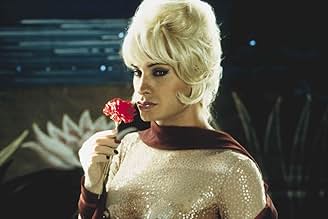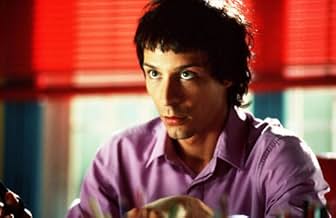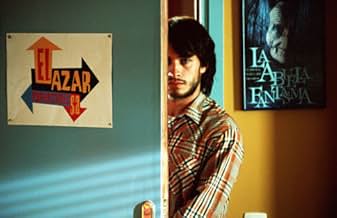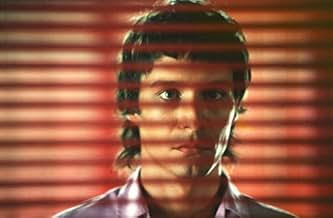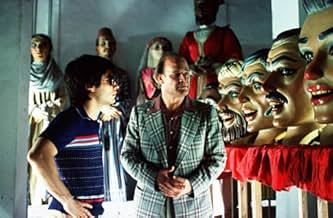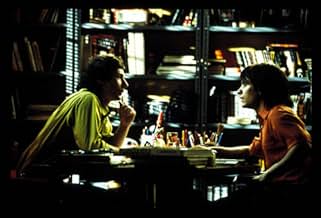CALIFICACIÓN DE IMDb
7.4/10
65 k
TU CALIFICACIÓN
Una mirada a los efectos que tuvieron las escuelas religiosas franquistas y sus abusos sexuales a través de los ojos de dos amigos de infancia.Una mirada a los efectos que tuvieron las escuelas religiosas franquistas y sus abusos sexuales a través de los ojos de dos amigos de infancia.Una mirada a los efectos que tuvieron las escuelas religiosas franquistas y sus abusos sexuales a través de los ojos de dos amigos de infancia.
- Nominada a1 premio BAFTA
- 16 premios ganados y 42 nominaciones en total
Nacho Pérez
- Ignacio
- (as Ignacio Pérez)
Raúl García Forneiro
- Enrique
- (as Raúl Gª Forneiro)
Agustín Almodóvar
- Limpiador Piscina
- (sin créditos)
Pedro Almodóvar
- Limpiador Piscina
- (sin créditos)
Robert Forcadell
- Man in public
- (sin créditos)
Luis Lobos Negros
- Motero ochentero
- (sin créditos)
- Dirección
- Guionista
- Todo el elenco y el equipo
- Producción, taquilla y más en IMDbPro
Opiniones destacadas
In "La Mala Educación", Almodóvar is very serious and too dark and tragic, when comparing to his previous movies. There are many usual elements, such as the attack to the Catholic Church, gays, travesties, homosexual intercourse, child abuse etc., but not in his common ironical, colorful and funny way; instead, the story is developed in a very bitter context. The screenplay magnificently discloses the plot, with a story inside another story, mixing "reality" with fiction; the direction of Pedro Almodóvar is excellent as usual; and Gael Garcia Bernal proves his versatility as an outstanding actor. Although being a great film, I do not dare to recommend "La Mala Educación" for any audiences. However, fans like me of this great Spanish director will certainly like it a lot. My vote is eight.
Title (Brazil): "Má Educação" ("Bad Education")
Title (Brazil): "Má Educação" ("Bad Education")
This is a difficult film to write about. For one thing, to describe the plot would be to give away the twists and thus spoil its surprises; but for another, it's impossible to take a great work of art and put it into words. That said, here goes:
Truth be told, it was the promise of Gael Garcia Bernal (whom I've loved since "Y Tu Mama Tambien") in drag that piqued my interest in seeing "Bad Education." The only other Almodovar movie I'd seen before this was "Talk to Her," which I was on the fence about, but if Gael Garcia Bernal was involved, I was happy to give Almodovar another shot. (Interestingly, "Bad Education" has given me a new appreciation of "Talk to Her." The two films share a lot of themes -- false identity and self-creation, the willful self-deception and fantasy of falling in love, the spiritualization of aesthetic beauty -- not to mention a hypnotic use of music, an indifferent attitude towards women, and a few actors I recognized.)
Almodovar's genius in both "Bad Education" and "Talk to Her" is his ability to set the scene, stringing the audience along, lulling it into a sense of comprehension and security, and then suddenly turning the tables with a twist of such dizzying magnitude that the mind, reeling, forced to give up on trying to understand, must just relax and allow the movie to take over -- miraculously, all without leaving the audience feeling manipulated. In "Bad Education," he takes this device to breathless, upper-atmospherical levels, for with each twist, the film takes on a new genre.
It begins as a tender coming-of-age story, interspersed with boarding-school flashbacks reminiscent of such French fare as Louis Malle's "Au revoir, les enfants" and François Truffaut's "L'argent de pôche," although I sensed a lot of Fellini in the mod outfits, feathery hairstyles, and picturesque bicycle-strewn streets. Probably the most romantic segment of the film, it alludes even to "Breakfast at Tiffany's" (Henry Mancini's "Moon River" hasn't been employed so creatively since last year's "Angels in America"). Indeed, the performances are so endearing, the cinematography so warm and luminous, that this segment of "Bad Education" could easily exist as its own self-contained movie. I was fully prepared to embrace it and love it as a sincere period romance.
But without warning, the film turns itself upside down and becomes an exhilarating meta-commentary in the vein of Charlie Kaufman's "Adaptation" (complete with crocodiles). Romance turns to farce and tragedy to comedy as the self-consciously cinematic style gives way to the silliness of a movie-within-a-movie.
Unlike "Adaptation," though, "Bad Education" goes on, and in this way it retains its heart and soul. Further twists are introduced, and the movie metamorphoses into a mystery, a thriller, a dark rain-soaked noir -- by the end, I felt as though I had just lived through a hundred years of cinema history, all condensed into less than two rich, glorious hours.
So what holds it all together? The answer is Gael Garcia Bernal. He is a true movie star -- divinely beautiful, dazzlingly charismatic, with that all-important aura of mystery -- and though he virtually plays five characters as his character transforms along with the film, his strikingly calm blue-green eyes and sensual mouth provide a steady center for the madness around him. Despite the rumors of his abusive treatment on set at the hands of Almodovar, Garcia Bernal has a dignity (without which "Bad Education" would collapse under the weight of its own intelligence) that no amount of makeup, wigs, dresses, induced anorexia, or fake Spanish lisping can mask.
"Bad Education" was one of the most intense movie-going experiences I've ever had, and if its future doesn't hold critical acclaim and recognition as a classic, then there's no justice in the world.
Truth be told, it was the promise of Gael Garcia Bernal (whom I've loved since "Y Tu Mama Tambien") in drag that piqued my interest in seeing "Bad Education." The only other Almodovar movie I'd seen before this was "Talk to Her," which I was on the fence about, but if Gael Garcia Bernal was involved, I was happy to give Almodovar another shot. (Interestingly, "Bad Education" has given me a new appreciation of "Talk to Her." The two films share a lot of themes -- false identity and self-creation, the willful self-deception and fantasy of falling in love, the spiritualization of aesthetic beauty -- not to mention a hypnotic use of music, an indifferent attitude towards women, and a few actors I recognized.)
Almodovar's genius in both "Bad Education" and "Talk to Her" is his ability to set the scene, stringing the audience along, lulling it into a sense of comprehension and security, and then suddenly turning the tables with a twist of such dizzying magnitude that the mind, reeling, forced to give up on trying to understand, must just relax and allow the movie to take over -- miraculously, all without leaving the audience feeling manipulated. In "Bad Education," he takes this device to breathless, upper-atmospherical levels, for with each twist, the film takes on a new genre.
It begins as a tender coming-of-age story, interspersed with boarding-school flashbacks reminiscent of such French fare as Louis Malle's "Au revoir, les enfants" and François Truffaut's "L'argent de pôche," although I sensed a lot of Fellini in the mod outfits, feathery hairstyles, and picturesque bicycle-strewn streets. Probably the most romantic segment of the film, it alludes even to "Breakfast at Tiffany's" (Henry Mancini's "Moon River" hasn't been employed so creatively since last year's "Angels in America"). Indeed, the performances are so endearing, the cinematography so warm and luminous, that this segment of "Bad Education" could easily exist as its own self-contained movie. I was fully prepared to embrace it and love it as a sincere period romance.
But without warning, the film turns itself upside down and becomes an exhilarating meta-commentary in the vein of Charlie Kaufman's "Adaptation" (complete with crocodiles). Romance turns to farce and tragedy to comedy as the self-consciously cinematic style gives way to the silliness of a movie-within-a-movie.
Unlike "Adaptation," though, "Bad Education" goes on, and in this way it retains its heart and soul. Further twists are introduced, and the movie metamorphoses into a mystery, a thriller, a dark rain-soaked noir -- by the end, I felt as though I had just lived through a hundred years of cinema history, all condensed into less than two rich, glorious hours.
So what holds it all together? The answer is Gael Garcia Bernal. He is a true movie star -- divinely beautiful, dazzlingly charismatic, with that all-important aura of mystery -- and though he virtually plays five characters as his character transforms along with the film, his strikingly calm blue-green eyes and sensual mouth provide a steady center for the madness around him. Despite the rumors of his abusive treatment on set at the hands of Almodovar, Garcia Bernal has a dignity (without which "Bad Education" would collapse under the weight of its own intelligence) that no amount of makeup, wigs, dresses, induced anorexia, or fake Spanish lisping can mask.
"Bad Education" was one of the most intense movie-going experiences I've ever had, and if its future doesn't hold critical acclaim and recognition as a classic, then there's no justice in the world.
With 'La Mala Educación' Pedro Almodóvar has surpassed himself. It's a very intelligent film with wisely-chosen actors. Gael García Bernal is simply magnificent in portraying three very different characters. This goes to show that he's not only got looks but also a great talent. It couldn't have been easy for him, especially when doing the role of Zahara! Fele Martínez is also very good as Enrique, Ignacio's beloved childhood friend. A round of applause goes to the young Ignacio as well. One can see the anxiety in his eyes when Father Manolo approaches him. The latter's frustration is very clearly brought out in the direction of certain scenes by Almodóvar. Definitely not a film to miss!
Is it an accusation of the Catholic Church or is it the story of a priest who is bound by his religion to strict rules concerning sex and feelings? Is there a theme in the film or is it just a story? Those are a couple of questions I asked myself after seeing La Mala Educación from the Spanish director Pedro Almodóvar.
Actually, La Mala Educación exists of three stories which have been interwoven in a miraculous way. Story one: film director Enrique is being paid a visit by a long lost friend. That friend, Ignacio, is an actor and has written a story that Enrique might want to make into a film. Enrique's story is for one part made up by Ignacio's and Enrique's experiences when they were young boys and were living in a Catholic boarding school. Ignacio reads the manuscript and sees the pictures in his head, and that is story two: a transvestite finds an old friend, Ignacio. After having sex, the transvestite steals a manuscript Ignacio wrote about his secret: while in boarding school he was sexually abused by a priest. To gain money, the transvestite blackmails the priest: give me money or I'll publish the manuscript. The priest reads parts of the manuscript. And that is the third story: the experiences of the real Enrique and the real Ignacio while attending boarding school. During that time they discovered the meaning of friendship, love and physical desires.
You have to keep up with the film. When your attention wanes you might miss a detail that's important later. When seeing the film, try to remember the names of the characters very quickly. It makes viewing easier.
Is La Mala Educación a typical Pedro Almodóvar film? Yes and no. No, since women are not the main theme, as in his other films. No, because it's not an unbelievable and absurdist story. Yes, since the film has some typical Almodóvar characteristics: the transvestite, the junkie that is caught on the lee shore, and the hope people have to reach a better life. More than in other Almodóvar films homosexuality is an important theme.
When the film was over you could see the visitors of the cinema thinking: is it a film about the Catholic Church, about emotions and selfishness, about The scenes had to fall in place.
Actually, La Mala Educación exists of three stories which have been interwoven in a miraculous way. Story one: film director Enrique is being paid a visit by a long lost friend. That friend, Ignacio, is an actor and has written a story that Enrique might want to make into a film. Enrique's story is for one part made up by Ignacio's and Enrique's experiences when they were young boys and were living in a Catholic boarding school. Ignacio reads the manuscript and sees the pictures in his head, and that is story two: a transvestite finds an old friend, Ignacio. After having sex, the transvestite steals a manuscript Ignacio wrote about his secret: while in boarding school he was sexually abused by a priest. To gain money, the transvestite blackmails the priest: give me money or I'll publish the manuscript. The priest reads parts of the manuscript. And that is the third story: the experiences of the real Enrique and the real Ignacio while attending boarding school. During that time they discovered the meaning of friendship, love and physical desires.
You have to keep up with the film. When your attention wanes you might miss a detail that's important later. When seeing the film, try to remember the names of the characters very quickly. It makes viewing easier.
Is La Mala Educación a typical Pedro Almodóvar film? Yes and no. No, since women are not the main theme, as in his other films. No, because it's not an unbelievable and absurdist story. Yes, since the film has some typical Almodóvar characteristics: the transvestite, the junkie that is caught on the lee shore, and the hope people have to reach a better life. More than in other Almodóvar films homosexuality is an important theme.
When the film was over you could see the visitors of the cinema thinking: is it a film about the Catholic Church, about emotions and selfishness, about The scenes had to fall in place.
Enrique is a film director working on his new project when an old school friend, Ignacio, arrives looking for acting work. Enrique fobs him off with excuses and Ignacio leaves him with a story he has written called 'The Visit'. The story is based on their childhood together as well as having a totally fictional section where Ignacio (Zahara). As Enrique reads the story it takes him back to his childhood effectively where they fell in love as boys before being separated by Father Manolo who also loved Ignacio. When he decides to make the film of the story it only serves to spark more memories as well as bringing revelations.
When I read the plot summary for this film I assumed that it would be difficult to penetrate (pardon the pun) and that I would struggle to follow it. Now that I think back on it I wonder how on earth I managed to follow a film that has threads and characters that don't exist even within the film and it is to the film's credit that it works really well. The film appears to have about three of four stories but really it is only one story that we are being told and a very effective story it is. It is engaging and very well written we care about the characters even as they change and trick us. Only the final 20 minutes appear to be unsure of themselves and it is here that the film drags slightly, but at till this point it is all great. This is not to say it is an easy watch because it isn't.
If you are homophobic then this is not the film for you I am used to seeing shows (Oz, 6 Ft Under) where such acts are portrayed but I was taken aback by the graphic nature of the acts here. I don't mean you see anything but it leaves very little to your imagination. This is not a problem it's just that many men may find this difficult to watch. Likewise scenes involving mutual masturbation between young boys is hardly something that one can watch without feeling slightly uncomfortable. However the one thing the film does through all this is deliver good characters. As much as I couldn't watch Ignacio licking his fingers to wet his 'area' and ease penetrate I still liked him as a character. Even more pleasing was the fact that the film never makes Father Manolo a monster; of course there is no sympathy for the man in the film but it could have just made him a lecherous beast who the audience immediately hate a pantomime villain but the script creates a more complex character.
The cast do a great job of delivering these characters and they make it work very well even if come of them have to change characters midstream or be one of several actors playing the same character. Martínez plays the most consistent character in the film and he does well with a good part, even if he has a less showy role than some others. Bernal has the most difficult role and he does really well to keep the audience with him while delivering all sorts of roles! If nothing else he is a brave actor and he deserves good parts to do more work like this. I don't know the rest of the actors by name but I enjoyed the other queen in the fictional part and also the guy who played Manolo in the fictionalised and childhood sections. Boira's Ignacio lacks subtlety and is overblown but by his point of the film I think that was the whole point.
Overall this is far from most people's cup of tea even those used to seeing art films may find it hard going due to the graphic simulation of the sexual acts within the film. But despite this the film is really well delivered. Many Almodóvar fans have said this is one of his lesser films but I cannot agree when I think of the skill he displays in keeping the difficult narrative together. The characters are mostly well written and the story is engaging even if it flags a little bit at the end.
When I read the plot summary for this film I assumed that it would be difficult to penetrate (pardon the pun) and that I would struggle to follow it. Now that I think back on it I wonder how on earth I managed to follow a film that has threads and characters that don't exist even within the film and it is to the film's credit that it works really well. The film appears to have about three of four stories but really it is only one story that we are being told and a very effective story it is. It is engaging and very well written we care about the characters even as they change and trick us. Only the final 20 minutes appear to be unsure of themselves and it is here that the film drags slightly, but at till this point it is all great. This is not to say it is an easy watch because it isn't.
If you are homophobic then this is not the film for you I am used to seeing shows (Oz, 6 Ft Under) where such acts are portrayed but I was taken aback by the graphic nature of the acts here. I don't mean you see anything but it leaves very little to your imagination. This is not a problem it's just that many men may find this difficult to watch. Likewise scenes involving mutual masturbation between young boys is hardly something that one can watch without feeling slightly uncomfortable. However the one thing the film does through all this is deliver good characters. As much as I couldn't watch Ignacio licking his fingers to wet his 'area' and ease penetrate I still liked him as a character. Even more pleasing was the fact that the film never makes Father Manolo a monster; of course there is no sympathy for the man in the film but it could have just made him a lecherous beast who the audience immediately hate a pantomime villain but the script creates a more complex character.
The cast do a great job of delivering these characters and they make it work very well even if come of them have to change characters midstream or be one of several actors playing the same character. Martínez plays the most consistent character in the film and he does well with a good part, even if he has a less showy role than some others. Bernal has the most difficult role and he does really well to keep the audience with him while delivering all sorts of roles! If nothing else he is a brave actor and he deserves good parts to do more work like this. I don't know the rest of the actors by name but I enjoyed the other queen in the fictional part and also the guy who played Manolo in the fictionalised and childhood sections. Boira's Ignacio lacks subtlety and is overblown but by his point of the film I think that was the whole point.
Overall this is far from most people's cup of tea even those used to seeing art films may find it hard going due to the graphic simulation of the sexual acts within the film. But despite this the film is really well delivered. Many Almodóvar fans have said this is one of his lesser films but I cannot agree when I think of the skill he displays in keeping the difficult narrative together. The characters are mostly well written and the story is engaging even if it flags a little bit at the end.
¿Sabías que…?
- TriviaGael García Bernal fired off an angry riposte to New York Times reporter Lynn Hirschberg after she claimed that he had fallen out with Pedro Almodóvar over filming the explicit homosexual love scenes in the film. Bernal wanted it on record that he had had absolutely no reservations about taking the role.
- ErroresWhen Burenguer declines Ignacio's story over the phone, he says that he wouldn't be accepting it for "Short Stories of the 80's." According to his story, it would have had to been at least 1977, three years before the 1980s, let alone before a compilation of stories from the 1980s would be released.
- Versiones alternativasAn R-rated version of the film that trims or cuts some scenes was released on DVD, though the original NC-17 one is also available in the exact same format.
- Bandas sonorasQuizás, Quizás, Quizás
Written by Osvaldo Farrés
Published by Peer International Corporation (BMI)
(c) 1947 by Caribbean Music Co. Ltd
Performed by Sara Montiel
By the license from Dpto. de Productos Especiales de (p) EMI Odeon, S.A., Madrid, España, 2003
Selecciones populares
Inicia sesión para calificar y agrega a la lista de videos para obtener recomendaciones personalizadas
- How long is Bad Education?Con tecnología de Alexa
Detalles
- Fecha de lanzamiento
- Países de origen
- Sitio oficial
- Idiomas
- También se conoce como
- Bad Education
- Locaciones de filmación
- Productoras
- Ver más créditos de la compañía en IMDbPro
Taquilla
- Presupuesto
- USD 5,000,000 (estimado)
- Total en EE. UU. y Canadá
- USD 5,284,284
- Fin de semana de estreno en EE. UU. y Canadá
- USD 147,370
- 21 nov 2004
- Total a nivel mundial
- USD 40,432,275
- Tiempo de ejecución1 hora 46 minutos
- Mezcla de sonido
- Relación de aspecto
- 2.35 : 1
Contribuir a esta página
Sugiere una edición o agrega el contenido que falta

